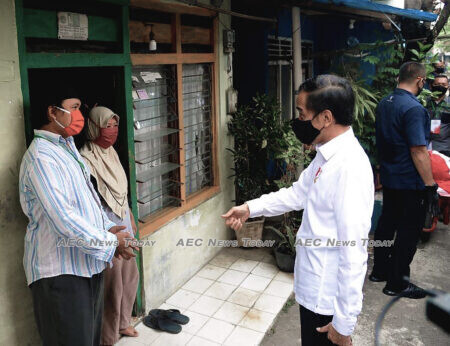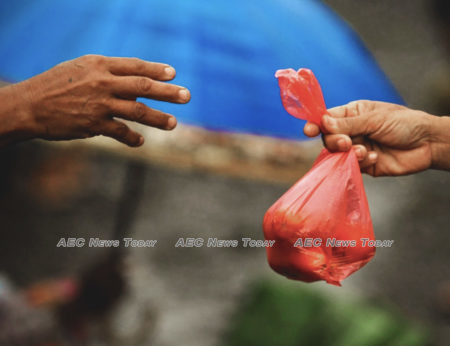COVID-19 is a wake-up call for the world. The pandemic has brought some of the worst economic impacts since World War II. While some Eastern countries seem much better prepared than their Western peers in terms of handling infections, testing ,and mitigating the pandemic’s economic impacts, the poorest countries will be hit hardest.
As of July 19, COVID-19 has killed more than 600,000 people, infected more than 14 million, and brought about half a billion people — eight per cent of the world’s population — into poverty; 60–80 million into extreme poverty.
In Indonesia COVID-19 has caused 4,016 deaths, infected almost 85,000 people, and brought more than 1.1 million into poverty .
An estimated 30 million Indonesians will fall into poverty this year — worse than Indonesia’s experience after the global financial crisis (GFC).
The COVID-19 pandemic is affecting the Indonesian economy in three ways.
First, lower global demand is reducing demand for Indonesia’s main export products.
Second, as global capital dries up, foreign direct investment (FDI) to Indonesia is also decreasing.
Three years to recover

A drop in tourism is also hitting services and many small and medium-sized enterprises (SMEs) hard. As a result, the Indonesian economy is estimated to grow at a maximum of just 0.5 per cent this year, and only if the Chinese economy can grow at 1.2 per cent.
It will take Indonesia at least three years to recover its COVID 19-related economic losses.
To mitigate the economic impacts of COVID-19, the Indonesian government launched a major fiscal stimulus package totalling around Rp405.1 trillion (about US$28 bln), equivalent to about 2.5 per cent of gross domestic product (GDP).
Of this, Rp75 trillion ($5.2 bln) is earmarked to support the healthcare sector, Rp110 trillion ($7.6 bln) for social safety nets (SSNs), Rp70.1 trillion ($4.9 bln) for tax incentives, and Rp150 trillion ($10.4 bln) for National Economic Recovery (NER).
The fiscal stimulus package is accompanied by monetary stimulus that will reduce interest rates to 4.5 per cent, lower reserve requirements for banks, and increase the maximum duration for repos and reverse repos to up to 12 months.
The stimulus will also introduce daily repo auctions and increase the frequency of foreign exchange swap (Forex swap) auctions. Bank Indonesia (BI) will take measures to ease liquidity conditions, and support bond market stability.
SSNs must be temporary
While a combination of fiscal and monetary stimulus packages is a good start, there are many areas for improvement in its implementation.
First, the COVID-19 SSNs must be effective and efficient, but temporary.
Indonesia should learn from its past mistakes and ensure that subsidies for fuel and rice are provided at the cost of future generated income.
The payment should be delivered according to a clear, single criterion.

For example, the social protection payment should go to families that do not have access to electricity, or who use a maximum of or less than 450 watts per month.
Second, all tax incentives should go only to productive sectors such as agriculture, industry, and services.
In the last 10 years, around 30 per cent of loans went to consumption goods, and only 15.8 per cent to industry. Agriculture, forestry, and fisheries received just 7 per cent.
There is no reason for lower interest rates on property or consumer goods. Easing both the interest rate and the terms of the interest for productive activities will help to ‘correct’ the economy in the long run. If the government fails to achieve this, Indonesia will be trapped into providing subsidies for unused commodities.
Rising youth unemployment
Third, to address the issue of rising youth unemployment, the government launched ‘pre-employment cards’ on April 11 this year. The scheme provides unemployed people with access and funding for a range of training to improve their chances of finding work.
The government has allocated Rp20 trillion ($1.4 bln) for the programme, targeting 5.6 million workers who were either laid off or furloughed, including informal workers and SMEs impacted by COVID-19.
Each beneficiary will receive a Rp1 million ($69) training fun, post-training incentives of Rp 600,000 ($41.5) a month for four months, and an incentive of Rp 150,000 ($10.4) for completing three surveys on their working status.
The programme was received with great enthusiasm — 1.4 million people applied for it on the first day.

Despite good intentions in offering a multi-benefit programme that provides financial support as well improving skills and productivity, the pre-employment card has at least three caveats that need to be addressed.
First, the programme has been criticised because a large chunk of the funds goes to services providers for materials that were already readily and publicly available. This will not solve the core problem of the laid-off and furloughed workers, who urgently need ‘cash to survive’ while they wait for employment opportunities to arise.
Second, the programme lacks transparency in how training services providers are selected and how their credibility to share skills and education is determined.
Lastly, there are issues with the data on beneficiaries.
The government should have a clear database of targeted beneficiaries. But, in a recent interview a senior official mentioned that applicants can be rejected if they include low-quality pictures in their application. If the government is not well-prepared, there is a risk that the programme will not be rolled out fairly and well-distributed.
The bottom line is that the Indonesian government stimulus package and pre-employment card programme should be accompanied by a well-prepared list of targeted beneficiaries, and a well-designed monitoring and evaluation system to ensure that these programmes are ‘purely social and not political’.
This article was written by Lili Yan Ing, lead advisor (Southeast Asia Region) at the Economic Research Institute for ASEAN and East Asia (ERIA), Jakarta, and Yessi Vadila, trade analyst at the Indonesian Ministry of Trade (Kementerian Perdagangan Republik Indonesia). It first appeared on East Asia Forum under a Creative Commons License and is reproduced here with its permission.
Feature Photo Presiden Joko Widodo
Related:
- Indonesia’s premature easing of restrictions risks prolonged first wave: Experts (The Jakarta Post)
- bonds|29 June, 2020 Indonesia c.bank may buy low-yielding govt bonds to support pandemic fight (ZAWYA)
- Indonesia: Indonesia Targets Taxation Of Tech Companies To Boost Economy Amid Covid-19 (Mondaq)
East Asia Forum
It consists of an online publication and a quarterly magazine, East Asia Forum Quarterly, which aim to provide clear and original analysis from the leading minds in the region and beyond.
Latest posts by East Asia Forum (see all)
- China’s South China Sea bullying seeing increased blowback from Asean claimants – February 2, 2022
- Illusionary, delusionary or visionary? Cambodia tests living with COVID-19 – December 6, 2021
- Prioritising a Philippine–EU FTA is vital for post-pandemic recovery – July 26, 2020
- Time for Asean to stand up for itself in the South China Sea – July 25, 2020


